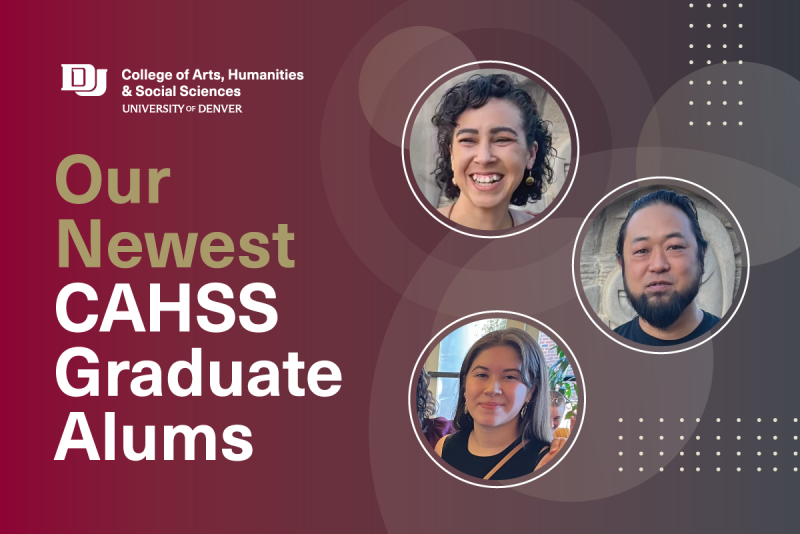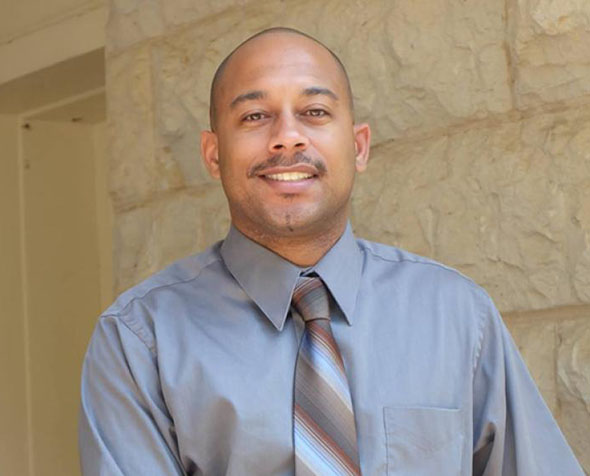CAHSS Honors Newest Graduate Alums through Inaugural Ceremony

Student-faculty camaraderie and inspiring stories of surmounting challenges characterized the College of Arts, Humanities & Social Sciences (CAHSS) inaugural graduation celebration for students in graduate programs last month. The event recognized our diverse graduates' enormous work, commitment and resilience as well as the support from families and friends that enabled them to succeed.
“It’s important that we take the time as a college to recognize the milestones that their graduate degrees represent,” said CAHSS Dean Rhonda M. Gonzales. “It’s an especially rewarding day for the graduates and their families, and also deeply satisfying for our faculty members who have invested so much of their time and expertise along our students’ academic journey.”
Paula Adamo, CAHSS associate dean and teaching professor, Spanish, emphasized the importance of students sharing stories about their experiences in grad school.
“Hearing students speak about their own journeys and hearing faculty speak shows why we’re doing what we’re doing,” she said, adding that the idea for the event arose from the recognition that CAHSS graduate students deserve to be celebrated.
“I was a grad student and most of us here have been grad students, and we know it takes a lot of effort to finish a degree. And it’s not just your effort. It took a lot of generational effort and support behind you to get you here today.”
Gonzales welcomed graduates into their new position as role models for future grad students. "We look forward to our new graduates' ongoing engagement as the newest members of our CAHSS alumni community," she said.
The CAHSS newsroom featured three of the nine graduate students who completed 10 degrees during fall quarter.
James Grau, master’s degree in Art History with a concentration in museum studies
Grau admits he never would have predicted 10 years ago while flying gunship helicopters for the U.S. Army that he would be receiving a degree in art history. “But I was really interested in museums, made the move do this and couldn’t have asked for a better group of mentors to help me become a professional in a field at the polar opposite end of the spectrum from my role in the Army,” he added.
Grau, who started the master’s program in fall 2019, persevered through multiple ankle surgeries that interrupted his studies.
“As frustrating as these delays were, I kept the mantra that knowledge and enrichment are worth more than a date of graduation,” he said.
He credits Art History Professor Scott Montgomery, Dean Sobel, associate professor of the practice of art history and museum studies and Art History Professor Annette Stott with “always being supportive while challenging me to tackle complex projects.” He added that he modeled his master’s research paper after Montgomery’s work on psychedelic posters of the 1960s and 1970s.
Montgomery, who served as Grau’s advisor for his master’s research paper (MRP), expressed praise and admiration over Grau’s enthusiasm and unique sensibilities.
“James was always bursting with ideas and plans — big, complex plans,” he said. “He focused his attention for his MRP on the early development of the horrific in heavy metal album cover art as a ‘test case’ for his ‘AGHAST Museum’ concept [Grau’s ongoing project to create a nonprofit cultural organization that emphasizes unusual, horrific work and images].”
Montgomery added that “James took on material that was at times genuinely shocking and disturbing, even to these jaded eyes. This shock and awe were masterfully countered by extremely insightful and subtle analysis wrapped in truly beautiful prose.”
“To endeavor to apply such an approach to all material that I might not comprehend immediately is a nice take-away lesson from working with James on this material,” he added. “The student has most decidedly taught the teacher.”
Andrea Hernandez-Perez, master’s in International and Intercultural Communication, Department of Media, Film & Journalism Studies
For Hernandez-Perez, the class she took with Associate Professor Nadia Kaneva on branding and identity offered the sense of direction and purpose she had hoped her master’s program would deliver.
“I fell in love with the material and decided that I am a good fit for marketing and [branding and identity] marketing does fit in with international relations,” she said.
Currently working in DU’s Division of Marketing & Communications as the university’s first bilingual writer, Hernandez-Perez worked full-time throughout graduate school and juggled two jobs her first year before assuming her current position.
Unwavering motivation “to just get my work done,” along with time management skills and her relationship with Kaneva helped keep her on track.
“She gave me ideas and was there for me when I needed help,” Hernandez-Perez said. “I went through some difficult personal stuff, and she was always there to support me.”
Hernandez-Perez’s ability to work full-time creating new content for DU’s Spanish-speaking employees, while continuing with her studies impressed Kaneva.
“Andrea was often the first to arrive to class and the last to leave, eager to learn and participate, willing to explore new ideas and engage in dialogue even when other students were quiet,” she said.
A first-generation student whose parents immigrated from Mexico; Hernandez-Perez admits that her parents still can’t quite believe that she completed her master’s degree.
“They were so happy, but I feel like they still can’t come to terms with it until they see me accepting my diploma in my cap and gown in June,” she said, adding that she feels somewhat the same way.
“As an immigrant to this country myself, I was very touched to see a hard-working student from an immigrant background not only graduate but thrive at this university,” Kaneva said. “I know how much Andrea’s cultural heritage means to her and I was proud to be part of her journey and success.”
Vanessa Taylor, master’s degree in Anthropology with a concentration in museum and heritage studies
Taylor, a sport mountain climber accustomed to encountering unexpected obstacles, considers overcoming the challenges of starting graduate school in mid-2020 “deep into COVID” a major accomplishment.
“Though I was lucky enough to be allowed on campus for the most part, I was not able to interact with other students and staff,” she explained.
She credits Archeology Professor Bonnie Clark, her thesis advisor, with guiding her through the degree process.
“She was patient with me, excited for my work and encouraging,” Taylor added. “I had moments where I felt like my thesis was unimportant and just something to get me through. She never made me feel like I was failing, even when I felt like I was myself.”
Taylor took an unusual approach to writing her thesis, focusing on how people connect to the landscape of Yosemite National Park through sport climbing.
“I’ve advised other students doing research in national parks, but never someone whose main connection was through sport. Building on her experience climbing Yosemite, Vanessa was able to apply her scholarship on heritage places in an innovative way,” Clark said.
She added that she enjoyed seeing the group of fellow climbers who attended the graduation to celebrate Taylor’s achievement.
“As stressful as getting a master’s is, I think in the long-run I enjoyed every bit of it in part because of the people in my department, especially Bonnie, who helped me so much,” Taylor said. “I am a first-generation student so getting my master’s degree is a huge accomplishment for me and my family.”





